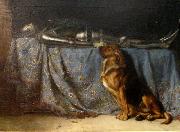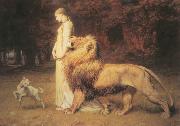Briton Riviere El petróleo que Pinta la ReproducciónAll Briton Riviere Oil Paintings(14 August 1840 C 1920) was an Irish artist born in London, England. His father, William Riviere, was for some years drawing-master at Cheltenham College, and afterwards an art teacher at Oxford University. He was educated at Cheltenham College and at Oxford, where he took his degree in 1867. For his art training he was indebted almost entirely to his father, and early in life made for himself a place of importance among the artists of his time. His first pictures appeared at the British Institution, and in 1857 he exhibited three works at the Royal Academy, but it was not until 1863 that he became a regular contributor to the Academy exhibitions. In that year he was represented by "The Eve of the Spanish Armada", and in 1864 by a "Romeo and Juliet". Subjects of this kind did not, however, attract him long, for in 1865 he began, with a picture of a "Sleeping Deer-hound", a series of paintings of animal-subjects which later occupied him almost exclusively. |
|||

|
|||
|
|
|||
|
||||||||
| Briton Riviere (14 August 1840 C 1920) was an Irish artist born in London, England. His father, William Riviere, was for some years drawing-master at Cheltenham College, and afterwards an art teacher at Oxford University. He was educated at Cheltenham College and at Oxford, where he took his degree in 1867. For his art training he was indebted almost entirely to his father, and early in life made for himself a place of importance among the artists of his time. His first pictures appeared at the British Institution, and in 1857 he exhibited three works at the Royal Academy, but it was not until 1863 that he became a regular contributor to the Academy exhibitions. In that year he was represented by "The Eve of the Spanish Armada", and in 1864 by a "Romeo and Juliet". Subjects of this kind did not, however, attract him long, for in 1865 he began, with a picture of a "Sleeping Deer-hound", a series of paintings of animal-subjects which later occupied him almost exclusively. |
||||||||
|
|
||||||||
| Pintura identificación:: 65895 'Requiescat' 1888(1888) Oil on canvas Art Gallery of New South Wales |
||||||||
|
|
||||||||
| Pintura identificación:: 69652 Requiescat oil on canvas painting by Briton Riviere, Art Gallery of New South Wales |
||||||||
|
|
||||||||
| Pintura identificación:: 86727 Una and Lion Medium Oil on canvas cyf |
||||||||
|
|
||||||||
|
| ARTISTA PREVIO PROXIMO ARTISTA | |||||||
|
|
||||||||
|
Briton Riviere (14 August 1840 C 1920) was an Irish artist born in London, England. His father, William Riviere, was for some years drawing-master at Cheltenham College, and afterwards an art teacher at Oxford University. He was educated at Cheltenham College and at Oxford, where he took his degree in 1867. For his art training he was indebted almost entirely to his father, and early in life made for himself a place of importance among the artists of his time. His first pictures appeared at the British Institution, and in 1857 he exhibited three works at the Royal Academy, but it was not until 1863 that he became a regular contributor to the Academy exhibitions. In that year he was represented by "The Eve of the Spanish Armada", and in 1864 by a "Romeo and Juliet". Subjects of this kind did not, however, attract him long, for in 1865 he began, with a picture of a "Sleeping Deer-hound", a series of paintings of animal-subjects which later occupied him almost exclusively. |
||||||||
|
|
||||||||
|
CONTACTE EEUU |








